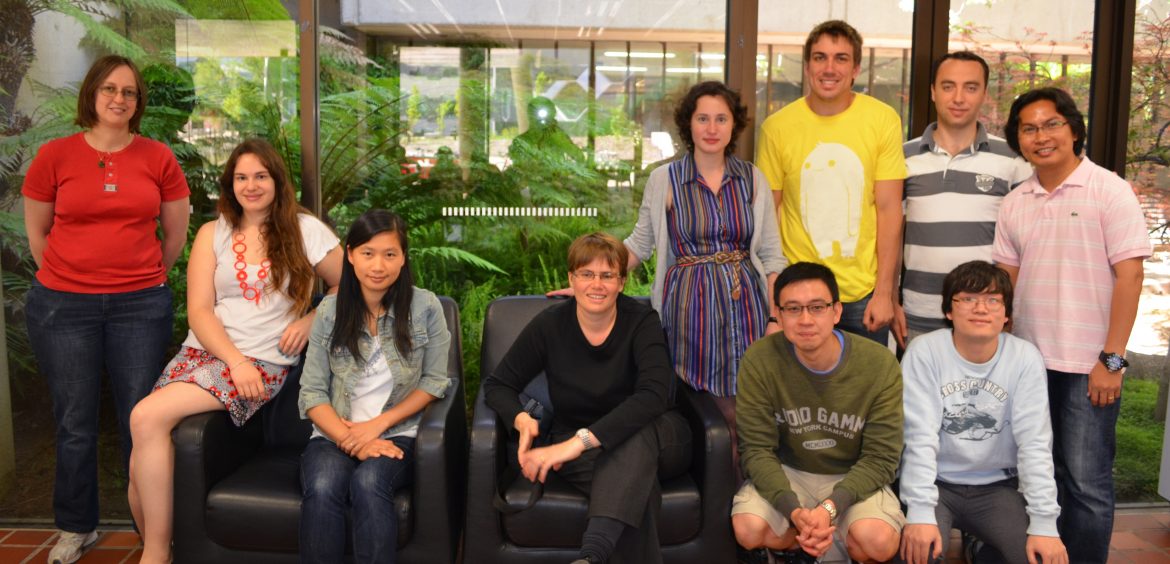it is possible for a normal person to pursue their interest in fundamental science and make brand new discoveries about how the world works
Professor Michelle Coote, FRSC, ARC Future Fellow, Research School of Chemistry, Australian National University
1990 NYSF Alumnus
Michelle Coote attended the NYSF (then called National Science Summer School (NSSS)) in January 1990.
“I had always had an interest in science and particularly astronomy, and was in the Galileo group at the NYSF. The NYSF experience convinced me to try a career in science but when it came time to choose a university course, industrial chemistry won out over astronomy as it offered good employment prospects and an attractive scholarship.”
Studying at the University of New South Wales (UNSW), Michelle spent 15 months working in the chemical industry, which was a valuable experience. “But it made me realise that my real interest was in a career in pure chemical research. So, I went back to university and ended up graduating in 1995 with the university medal.”
After that, Michelle enrolled in a PhD in polymer chemistry at UNSW where she used a combination of theory and experiment to tackle a long-standing question in copolymerization kinetics. Copolymers are polymers of two or more different types of chemical building blocks (known as monomers). Copolymers are very common as they allow favourable properties of different types of plastics to be combined in the same material. The improved models developed by Michelle can be used to tailor the compositions and microstructures of copolymers, and hence their properties, by changes to the reaction conditions.
Her thesis was awarded the Royal Australian Chemical Institute’s Cornforth medal for the best PhD thesis in chemistry in Australia and the International Union of Pure and Applied Chemistry prize for the best five (5) theses in chemistry worldwide. This helped to open up opportunities for further research positions.
A post-doctoral position at the University of Durham in the United Kingdom led to research running experiments on beam-lines at big facilities – such as the Rutherford Appleton Laboratories in Oxfordshire. But after a couple of years, she decided to change fields and study quantum chemistry instead. Michelle moved back to Australia and took up an Australian Research Council (ARC) postdoctoral fellowship at the Australian National University (ANU), to learn computational quantum chemistry from one of the greats of the field, Professor Leo Radom.
Late in 2004, Michelle was given the opportunity to start her own research group at the ANU when she was awarded a Rita Cornforth fellowship, which supports the careers of young women in chemistry. She was granted tenure in 2006 and became the first female Professor of chemistry at the ANU in early 2011. She is currently an ARC Future Fellow, and was recently awarded the Le Fevre memorial prize of the Australian Academy of Science and named by the Royal Australian Chemical Institute as a living luminary of Australian chemistry for the international year of chemistry.
“I’ve been fortunate to have a lot of opportunities over the years to pursue fundamental research, and to work with many excellent students, postdocs and collaborators. I always thought academic careers were only for geniuses but actually it is possible for a normal person to pursue their interest in fundamental science and make brand new discoveries about how the world works.”
Michelle lives with her husband and their two children, two cats, five chickens, and large garden in country NSW.
About Michelle and her team's research:
Michelle Coote’s research team uses accurate quantum chemical calculations, supported by experiments, to better understand chemical reactivity and to design improved reagents and catalysts. Her particular interest is radical chemistry, and particularly radical polymerization and autooxidation processes; more recently her group have been working toward a better understanding of enzyme catalysis. However, one of the advantages of computational chemistry is that it is not necessary to specialise and their computer-aided chemical designs include species as diverse as better control agents for free-radical polymerization, improved redox mediators for dye sensitised solar cells, and chiral auxiliaries for the resolution of amino acids. Whilst their focus is on the underlying fundamental chemistry, the team’s work does have direct practical applications and, for instance, Michelle is working with Bluescope Steel to improve the lifetime of the coatings on Colorbond steel, and Evonik Industries to tune the debonding temperature of self-healing polymers and printable networks.
